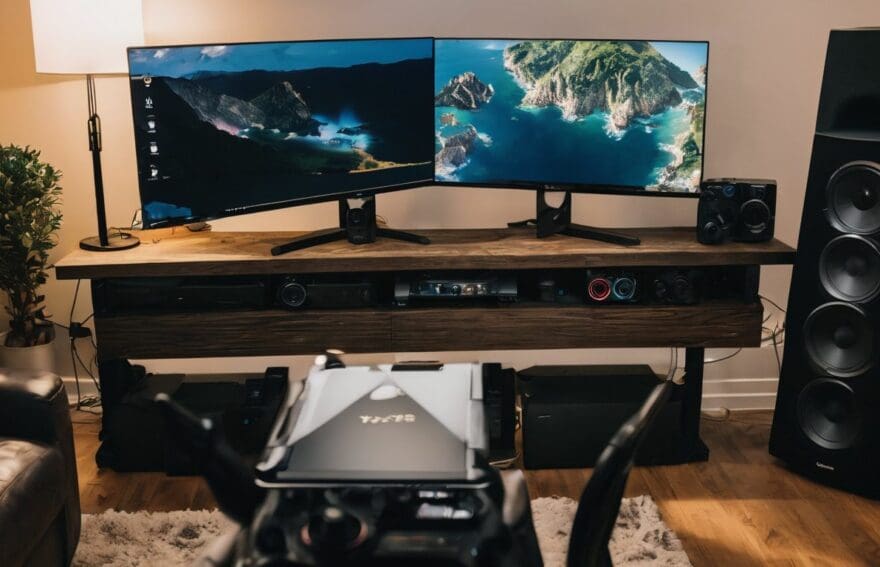Esports and Mental Wellness: Supporting Players in High-Stress Environments

Updated On: October 24, 2025 by James Connolly
Facing the intense pressure of esports competitions can be as nerve-wracking as any high-octane showdown on the field or court. We understand that tension all too well; our research has shown that mental stress doesn’t discriminate, gripping esports athletes just as it does those in traditional sports.
In our article, we explore strategies and support structures tailor-made to nurture mental wellbeing amidst the distinctive trials posed by this digital contest. Fancy boosting your psychological prowess? Read on for insight!
The Impact of Stress in Esports
Existing research on stress and coping in esports shows that players experience high levels of stress, which can impact their mental and physical wellbeing. Factors such as performance pressure, long hours of gameplay, and constant competition contribute to the significant stress levels experienced by esports athletes.
Existing Research on Stress and Coping in Esports
Studies have shown that we, as esports athletes, experience intense pressure akin to traditional sports professionals. This stress comes not only from the need to perform but also from maintaining concentration and executing complex strategies under tight timelines.
Our brains are constantly at work, navigating through rapid decision-making and problem-solving during competitions. Recent findings highlight how essential psychological skills are for our success in this high-stress environment; skills such as mental resilience and coping strategies become our armor against the onslaught of pressures.
Researchers point out that coping mechanisms used by us can make a significant difference in managing stress levels effectively. From mindfulness practices to building robust support networks, these strategies play a pivotal role in ensuring our emotional wellbeing remains steady amidst fierce competitions.
We strive to enhance both physical health and mental wellness to maintain high performance consistently while reducing burnout risks. Moving forward into exploring factors contributing to stress will shed more light on our journey towards optimal mental toughness and overall health in esports arenas.
Factors Contributing to High Stress Levels
Esports athletes experience high stress levels due to the intense competitive nature of gaming and the pressure to perform at a high level consistently. The demands of training, competition, and managing personal and professional responsibilities contribute to elevated stress levels. Additionally, the need for sustained attention, strategic planning, working memory, and inhibition control while gaming adds to the psychological burden on players.
- Intense competition in esports tournaments creates a constant pressure to excel, leading to heightened stress levels.
- Balancing extensive training schedules with personal commitments can result in chronic stress and burnout among esports players.
- The necessity to maintain peak performance during gameplay requires strong cognitive abilities, which can lead to mental fatigue and increased stress.
- The ever – evolving nature of competitive gaming necessitates constant adaptation and learning new strategies, adding an additional layer of stress for players.
- Managing the psychological impact of losing or underperforming in highly competitive environments contributes significantly to stress levels among esports athletes.
The Role of Mental Toughness in Esports
Mental toughness is crucial in helping esports players cope with the high levels of stress they face. It involves resilience, determination, and the ability to stay focused under pressure, all of which are invaluable skills for competitive gaming.
Definition and Measurement of Mental Toughness
Esports athletes require mental toughness to navigate the high-stress environment of competitive gaming. Mental toughness encompasses resilience, perseverance, and the ability to stay focused under pressure.
It involves traits such as confidence, motivation, and self-belief – crucial for handling the challenges in esports. Research has shown that mental toughness can be measured through assessments focusing on mindset, emotional control, and adaptability – all essential qualities for thriving in the fast-paced world of professional gaming.
Understanding an athlete’s level of mental toughness is vital for identifying areas for improvement and developing targeted interventions. By measuring this attribute, coaches and support staff can tailor strategies to enhance players’ psychological strength and fortitude.
Influence of Mental Toughness in Coping with Stress
Mental toughness plays a vital role in how players cope with the intense stress of esports. As athletes, we need to develop resilience and mental strength to navigate the pressures of training, competing, and maintaining our personal lives.
Research has shown that possessing mental toughness can significantly impact our ability to handle stress and maintain peak performance levels. These skills are essential for managing competitive pressure and promoting overall mental wellbeing.
Developing mental toughness empowers us to build effective coping strategies, enhancing our capacity to endure high-stress environments. By honing these psychological skills, we equip ourselves with the tools necessary to thrive amidst the demanding nature of esports competition.
Strategies for Promoting Mental Wellbeing in Esports Players
Identifying individual coping skills is crucial for promoting mental wellbeing in esports players, as it allows them to develop a personalised approach to managing stress. Creating a supportive team environment and focusing on sleep and balance also play significant roles in maintaining the mental health of players.
Identifying Individual Coping Skills
Esports players can develop individual coping skills to manage stress and promote mental wellness. Here are the strategies that can help them:
- Building a strong social support system to share experiences, seek advice, and receive emotional backing.
- Engaging in regular physical exercise to enhance mood, reduce stress, and improve overall well – being.
- Practising mindfulness and relaxation techniques such as deep breathing, meditation, or yoga to alleviate stress and anxiety.
- Setting achievable goals and breaking them down into manageable steps to maintain motivation and reduce feelings of overwhelm.
- Developing time management skills to balance gaming commitments with personal life responsibilities.
- Seeking professional help from mental health experts for guidance and support in navigating the challenges of esports careers.
- Cultivating hobbies outside of gaming to provide a healthy outlet for creativity, relaxation, and personal fulfillment.
Creating a Supportive Team Environment
Supporting a positive team environment is crucial for the mental wellbeing of esports players. Encouraging open communication and mutual respect among team members can foster a supportive atmosphere where individuals feel valued and understood.
Establishing trust within the team allows players to share their concerns, seek help, and work collaboratively towards solutions. By promoting inclusivity and diversity, teams can create an environment that respects individual differences while harnessing the unique strengths each player brings to the table.
Fostering a sense of camaraderie amongst teammates through team-building activities and shared experiences can strengthen bonds and create a support network for players to lean on in times of need.
Offering emotional support, constructive feedback, and guidance during challenging periods can contribute to creating an environment that empowers players to navigate high-stress situations with resilience.
Managing Sleep and Balance
- Establish a consistent sleep schedule that allows for 7-9 hours of rest each night to support overall health and cognitive function.
- Incorporate regular breaks and relaxation techniques into your daily routine to prevent burnout and maintain balance.
- Create a comfortable sleep environment by minimising screen time before bed, maintaining a cool temperature, and reducing noise disruptions.
- Practice good sleep hygiene by limiting caffeine intake, avoiding heavy meals close to bedtime, and engaging in calming activities before sleeping.
- Utilise time management strategies to allocate sufficient time for training, competition, personal obligations, and relaxation.
Gender and Game Types as Factors in Mental Health
Understanding the unique mental health challenges faced by esports players and promoting inclusivity and diversity in the industry are crucial for supporting players’ mental wellbeing.
Further research is needed to explore how gender and game types impact mental health in esports.
Understanding the Unique Mental Health Challenges Faced by Esports Players
Esports athletes encounter significant mental health challenges due to the high-pressure nature of competitive gaming. The demands of constant practice, performance expectations, and balancing personal life can lead to stress, burnout, depression, and anxiety among players.
Additionally, the immersive and competitive environment in esports can contribute to issues like addiction and aggression. With the increasing recognition of these challenges, it is crucial for the industry to provide comprehensive support systems tailored to address the unique mental health needs of esports athletes.
Moving forward with a focus on promoting inclusivity in esports,
Promoting Inclusivity and Diversity in the Esports Industry
Esports organisations should actively seek to create an inclusive and diverse environment, providing equal opportunities for players from all backgrounds. Recognising the importance of diversity in gaming not only fosters a sense of belonging but also showcases the richness that comes from various perspectives and experiences.
Embracing inclusivity also means addressing potential barriers faced by minority groups, such as gender disparities and unequal representation. Efforts towards promoting inclusivity and diversity will enhance team dynamics, foster creativity, and ultimately contribute to a more vibrant esports industry.
Encouraging participation from individuals of diverse backgrounds enriches the gaming community with fresh ideas and unique insights, which can lead to innovative strategies and solutions on how to best support mental wellness among players.
Conclusion
In conclusion, prioritising the mental wellbeing of esports players is crucial for their overall success and longevity in the industry. By implementing supportive strategies and promoting inclusivity, we can create a healthier environment for all gamers.
Future research should focus on developing more effective interventions to improve mental wellness in the fast-paced world of esports.
Importance of Prioritising Mental Wellbeing in Esports
Prioritising mental wellbeing is crucial for esports players to sustain high performance and manage stress effectively. Strategies such as identifying individual coping skills, creating a supportive team environment, and managing sleep are essential for promoting mental wellness.
Esports athletes face the same level of psychological pressure as traditional athletes, making it imperative to develop coping skills and strategies to enhance their physical and mental health during their gaming careers.
Moreover, understanding the unique challenges faced by esports players is necessary to promote inclusivity and diversity in the industry while addressing mental wellness needs.
By prioritising mental wellbeing in esports, we can support players in navigating the demands of high-stress environments, reducing the risk of burnout, depression, anxiety, addiction, and aggression.
Future Research Directions for Improving Mental Wellbeing in Esports.
Researching the impact of gender on mental health in esports is vital for developing targeted support strategies. Investigating how different game types affect players’ psychological well-being can provide insights into tailoring interventions.
Exploring the effectiveness of stress management techniques specific to esports, such as mindfulness or cognitive-behavioural approaches, could enhance players’ mental resilience and well-being.
Studying the long-term effects of excessive play and competitive pressures on physical and psychological health would shed light on preventive measures and early interventions. Understanding the unique challenges faced by novice gamers versus experienced professionals can inform inclusive support systems tailored to different skill levels.
Persistent work towards understanding individual coping skills within esports athletes will provide valuable insights into personalised mental wellness programmes. Identifying factors contributing to burnout, depression, anxiety, addiction, and aggression among esports players will enable targeted preventive initiatives.
Researching effective team-building strategies within esports organisations can foster a supportive environment that promotes mental well-being. Continually evaluating existing performance psychology methodologies in esports can lead to refined practices for enhancing stress management and overall mental toughness among players.
FAQs
1. What does mental wellness mean for esports players?
Mental wellness in esports is about maintaining a healthy mind to remain focused and perform well under the pressure of high-stakes competitions.
2. How can high-performance esports players manage stress?
High-performance players often work with coaches and use team-building exercises to improve their mental resilience, helping them cope with stress during tournaments.
3. Are there techniques to support mental wellness in esports?
Yes, there are many techniques such as regular physical exercise, mindfulness practices, and psychological support from professionals that can help maintain good mental health.
4. Why is team building important for players’ mental wellness?
Team building strengthens relationships and communication among teammates, which gives them a support network to rely on during challenging moments in high-stress environments.



